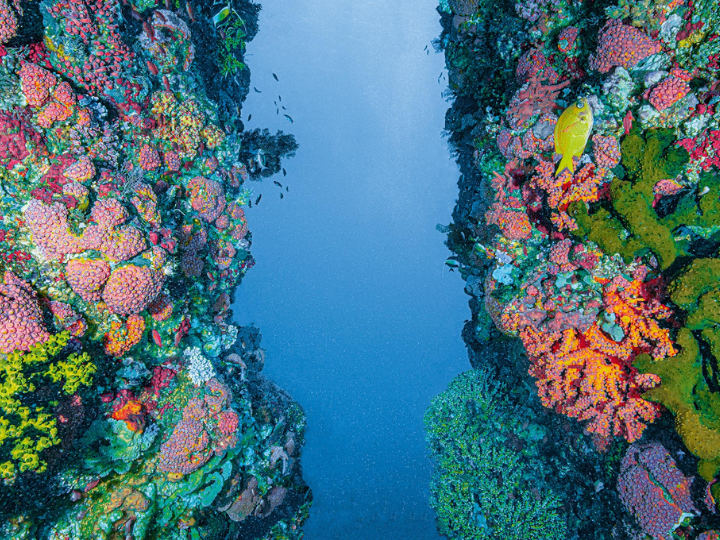by Olivia Rosane*
A first-of-its-kind study has examined the benefits of protecting the world’s oceans.
The study, published in Nature on Wednesday, endorsed protecting 30 percent of the world’s land and ocean by 2030 in order to protect biodiversity, restore fisheries and combat the climate crisis.
"Ocean life has been declining worldwide because of overfishing, habitat destruction and climate change. Yet only 7% of the ocean is currently under some kind of protection," Dr. Enric Sala, explorer in residence at the National Geographic Society and lead author of the study, said in a press release emailed to EcoWatch. "In this study, we’ve pioneered a new way to identify the places that — if strongly protected — will boost food production and safeguard marine life, all while reducing carbon emissions."
For the study, 26 researchers examined unprotected ocean areas to determine the ones most threatened by human activities, which protections would effectively mitigate. They then developed an algorithm to determine which areas would do the most to boost biodiversity, fisheries and climate action if protected. The idea was not to tell countries which areas to protect, but rather to give global decision makers a range of options depending on their priorities.
Biodiversity
Protecting the areas highlighted in the study could safeguard more than 80 percent of the habitats for endangered marine life. Ninety percent of the top 10 percent of priority areas were within the Exclusive Economic Zones of particular nations, the study authors found. Other priority areas were within international waters, such as the Antarctic Peninsula, the Mid-Atlantic Ridge, the Mascarene Plateau, the Nazca Ridge and the Southwest Indian Ridge.
"Perhaps the most impressive and encouraging result is the enormous gain we can obtain for biodiversity conservation — if we carefully chose the location of strictly protected marine areas," Dr. David Mouillot, a report co-author and professor at the Universite de Montpellier in France, said in the press release.
Fisheries
Protecting parts of the ocean can actually boost fisheries over time, because these areas serve as nurseries for commercial fish and crustacean species that eventually leave the protected area, The New York Times reported.
Researchers found that by strategically protecting 28 percent of the ocean, fish stocks would increase by about 6.5 million tons, compared with a business-as-usual model where nothing is protected and fishing continues at its current rate.
"Some argue that closing areas to fishing hurts fishing interests. But the worst enemy of successful fisheries is overfishing— not protected areas," Sala said in the press release.
Climate
The study also revealed a surprise finding about the fishing industry’s contribution to the climate crisis.
Bottom trawling — fishing by dragging heavy nets across the ocean floor — can release roughly the same amount of carbon into the ocean as the airline industry emits into the air. This is because marine sediments are important carbon stores that can safely hold carbon for millennia. However, if disturbed by dragging nets, these carbon deposits can revert back to carbon dioxide, increasing ocean acidification, hampering the ocean’s ability to absorb carbon dioxide and potentially reaching the atmosphere as greenhouse gas emissions.
This finding came as a surprise because researchers had not planned to calculate bottom trawling emissions until they were asked to by a peer reviewer, Sala told The Times.
"I could not believe it," he said of the data. "Immediately I went to Google and checked the global emissions by sector and by country, and said, ’Wow, this is larger than Germany’s.’"
About four percent of the world’s ocean would need to be protected in order to prevent most of these emissions, and most fall within national boundaries. The top 10 countries that contribute to bottom trawling emissions are China, Russia, Italy, the UK, Denmark, France, the Netherlands, Norway, Croatia and Spain, according to The Guardian.
International agreement
The study was released as part of the buildup to the 15th Conference of the Parties to the United Nations Convention on Biological Diversity, to be held in Kunming, China, later this year. Researchers and conservationists hope the study can offer a blueprint for these talks and bolster the goal of protecting 30 percent of global land and water by 2030.
"This research sets the foundation for the next era of ocean conservation to be one that truly places biodiversity and people at the heart of national conversations," Dr. Jennifer McGowan, study co-author from the Center for Biodiversity and Global Change at Yale University, said in the press release. "As the world prepares to set the global agenda for the next decade of climate and biodiversity policy, this research provides the bedrock upon which decisions-makers can map and plan interactions with the ocean to deliver multiple benefits for people and biodiversity."
*Freelance Reporter, Ecowatch
**first published in: www.weforum.org




 By: N. Peter Kramer
By: N. Peter Kramer
